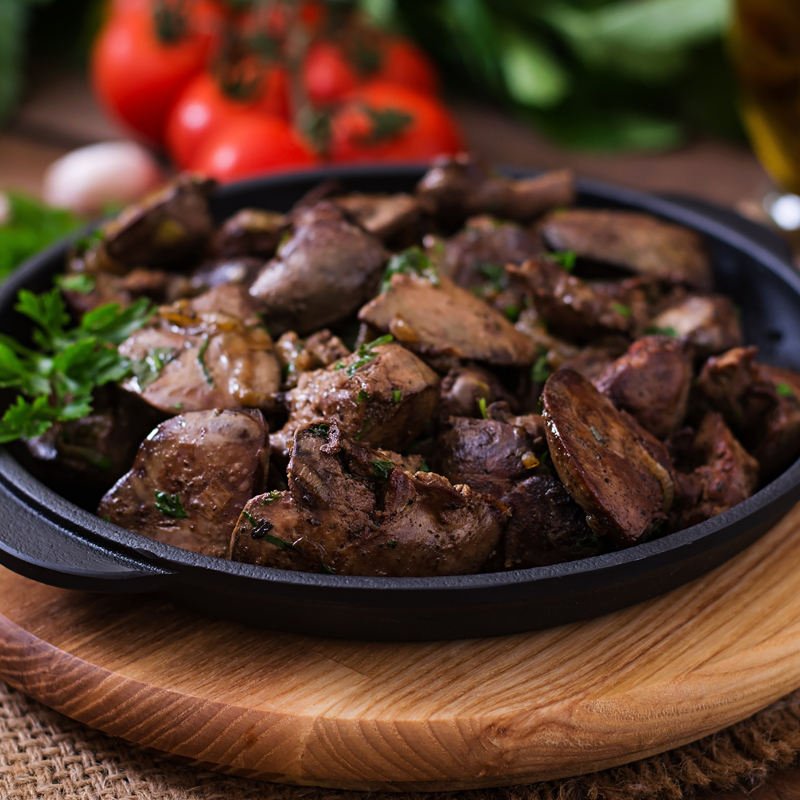
100 gr |
-- |
|
|---|---|---|
| Carbohydrate (gr) | 15.04 |
4928.47 |
| Protein (gr) | 3.59 |
1176.23 |
| Fat (gr) | 12.46 |
4083.43 |
| Fiber (gr) | 1.36 |
445.97 |
| Cholesterol (mg) | 14.64 |
4795.8 |
| Sodium (mg) | 325.27 |
106557.75 |
| Potassium (mg) | 392.16 |
128471.4 |
| Calcium (mg) | 78.15 |
25603.27 |
| Vitamin A (mg) | 46.04 |
15084.01 |
| Vitamin C (mg) | 6.16 |
2019.31 |
| Iron | 0.62 |
203.1 |
Chicken liver is a highly nutritious organ meat that is widely used in culinary traditions around the world. Packed with essential vitamins and minerals, it offers numerous health benefits. However, due to its high cholesterol content, it should be consumed in moderation, particularly by individuals with heart-related health concerns.
Calories in cooked chicken liver are 147 calories per 100 grams.
1. Rich in Folic Acid:
Folic acid is crucial for DNA synthesis, red blood cell formation, and cellular repair. Chicken liver is an excellent source of this nutrient, making it beneficial for individuals prone to anemia or those looking to improve energy levels.
2. High in Vitamin A:
Chicken liver contains a substantial amount of vitamin A, which supports eye health, boosts the immune system, and promotes healthy skin. Its vitamin A content makes it a valuable addition to diets aiming to improve vision and immunity.
3. Excellent Source of Iron and Zinc:
Iron from chicken liver is easily absorbed by the body, making it effective in preventing and treating iron deficiency anemia. Zinc, another key nutrient in chicken liver, supports immune function, aids in tissue repair, and contributes to enzymatic processes.
4. Contains Potassium:
Potassium plays a vital role in regulating blood pressure, maintaining fluid balance, and supporting muscle and nerve functions. Chicken liver is a good source of this essential mineral.
1. High Cholesterol Content:
Chicken liver is high in cholesterol, which may pose a risk for individuals with high cholesterol levels or heart disease. It is recommended to consume chicken liver in moderation to avoid adverse health effects.
2. Not Recommended for Heart Patients:
Individuals with heart conditions should limit or avoid the consumption of organ meats, including chicken liver, and opt for leaner protein sources such as chicken breast, fish, or plant-based alternatives.
Chicken liver is a versatile ingredient used in various cuisines worldwide. It can be sautéed, grilled, or incorporated into dishes such as pâtés, liver mousse, or curries. Popular dishes include Jewish chopped liver, French foie gras, and Indian-style liver masala. Its rich flavor and creamy texture make it a sought-after delicacy.
Incorporating chicken liver into your diet aligns with the sustainable practice of nose-to-tail eating, which minimizes food waste by utilizing all parts of the animal. This approach not only reduces environmental impact but also provides an affordable and nutrient-dense food source.
Chicken liver is a nutrient-rich organ meat offering significant amounts of folic acid, vitamin A, iron, zinc, and potassium. While its high cholesterol content requires cautious consumption, it can be a flavorful and nutritious addition to a balanced diet for individuals without heart-related concerns. When prepared thoughtfully, chicken liver serves as both a culinary delight and a sustainable food choice.